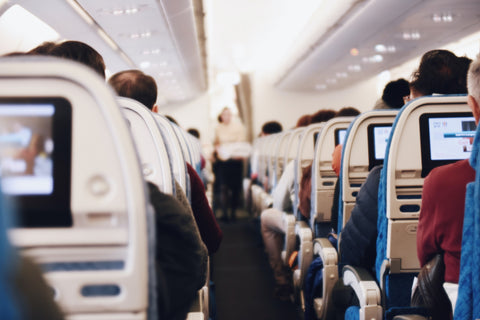
We all know about the sticky, dry air we’re forced to breathe when we fly — some people even claim it makes them sick. But exactly how bad is the air on our airplanes?
If you’ve ever flown on an airplane, you’ve probably wondered about the quality of the air blowing through the cabin. The big question mark around the subject has left some concerned for their health and in search of more information.
Many passengers take vitamin supplements before boarding to give their immune system a boost, and surgical masks are becoming an increasingly common sight on flights. Some flyers have even resorted to hiding under a blanket or a sweater in the hopes that this might somehow filter what they believe is contaminated air.
But how bad is cabin atmosphere, really?Dr. Charles Gerba, an environmental microbiologist at the University of Arizona at Tucson, told NBC that “Airplane air isn’t as bad as most people envision.”
In fact, your biggest concern should be that coughing, sniffling seatmate, or the airplane bathroom. “It’s more likely that the food you eat and the things you touch will make you sick.”
Breathe a Little Easier
So what’s really going on with the air up there? The truth is that commercial jets fly at an altitude that doesn’t allow humans to breath without some form of artificial assistance.
A common misconception is that passengers are breathing the same air when they land that was with them when they took off. But according to travel health expert Mark Gendreau, this simply isn’t true.
“Airplanes take about 50% of the air collected in the outtake valves of the passenger compartment and mix it with fresh air from outside that gets heated by the engines,” Gendreau explains. “That air is then passed through HEPA filters that sterilizes it before it’s reintroduced into the passenger cabin.”
Airlines actually take precautions to ensure that airflow between cabin seat rows is kept to a minimum. Surprisingly, airplane air is refreshed and recirculated more frequently than the air in most office buildings.
Boeing spokesperson Bret Jenson blames low humidity for the grogginess and discomfort that some passengers feel upon landing. “The overall relative humidity aboard an aluminum airplane is low — around 6% — and people become dehydrated on long flights if they don't drink water regularly. This can make people feel different than when they boarded the airplane.”
Other Risks
While cabin air quality may not be as bad as we believe, there are other atmospheric problems that can potentially arise during air travel. The Civil Aviation Authority (CAA) reports that they’ve received more than 1,300 reports of smoke or fumes inside passenger aircrafts since 2010.
This occurs when the air drawn in through the engines that refresh the circulated air comes into contact with substances like engine oil, hydraulic fluids, and harmful chemical lubricants called organophosphates.
According to the BBC, a number of former and current cabin crewmembers are pursuing legal action against British Airlines for health issues they claim stem from contaminated cabin air.
But experts remain skeptical about how serious this problem may actually be. Prof Alan Boobis, the director of Public Health England’s Toxicology Unit, estimates that fume leakage of this sort occurs in less than one out of every 2,000 flights.
He goes on to note that even in the unlikely event that leakage occurs, the levels of contamination would likely be too low to significantly affect humans.
Most airlines are concerned enough about passenger health that the air filtration systems are checked regularly and thoroughly, and the risk of air quality issues arising is relatively low. So the next time you travel by plane, you should probably be more concerned about washing your hands than covering your mouth.
Want a purifier that’s strong enough to clean the air that’s circulating through a jet plane? HEPA filters are also used in the top commercially-available air purifiers, and the best of those products are sold by Rabbit Air. If air quality is something that concerns you, a Rabbit Air purifier is an investment that will be more than worth your investment.




